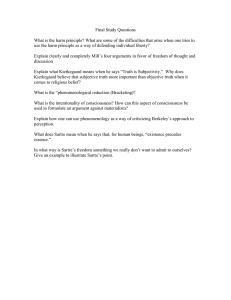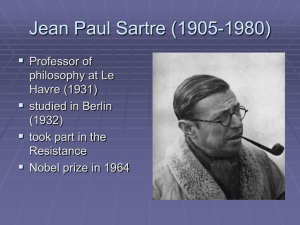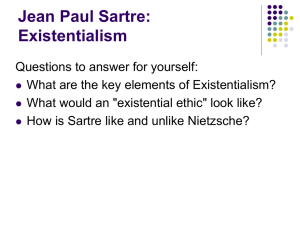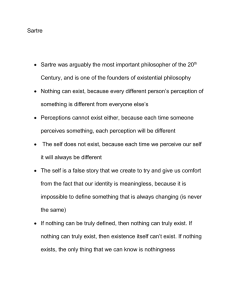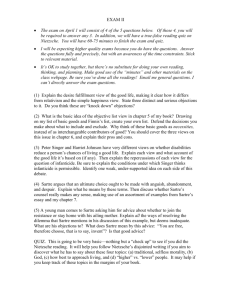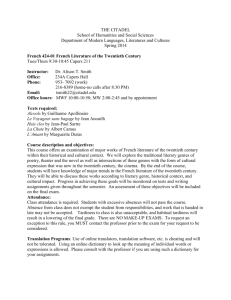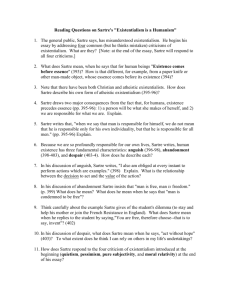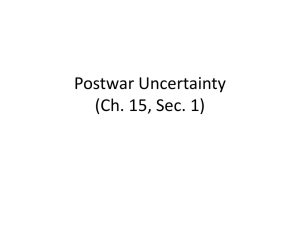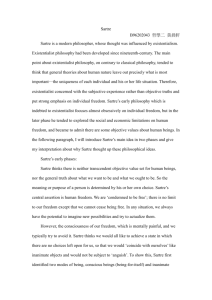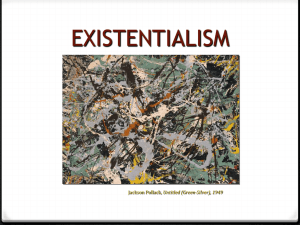Existentialism
advertisement
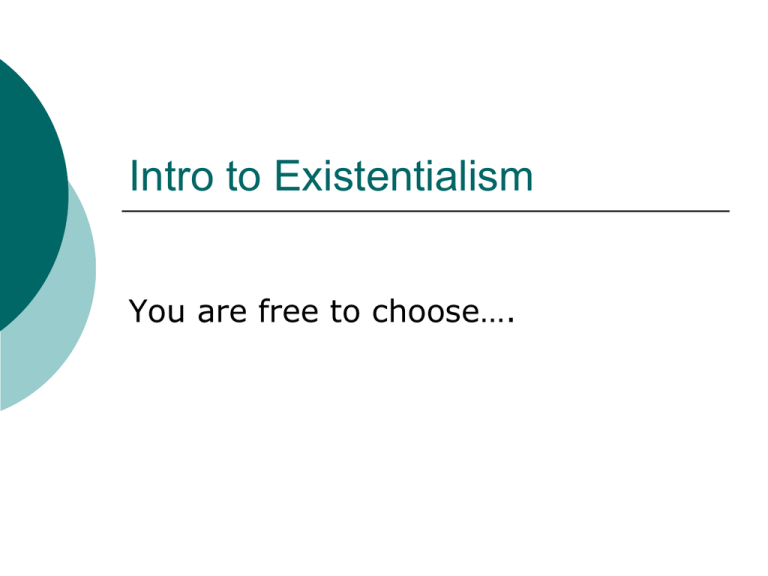
Intro to Existentialism You are free to choose…. What if….. What if there is no meaning or rational order or purpose to life itself? What if the universe is irrational, random, without unity or “higher” plan? What would that mean for you, as an individual? What if….. What if there is no human nature, no essence, and no pattern or formula to let you know what or who you are supposed to be? Would that cause you anxiety? To sink into despair? To feel less or more free? What if….. What if at the end of all of your thinking and praying you discover that reason and God and truth are but illusions? What would you feel abandoned? Powerless? Liberated? What if….. What if at the base of it all your meaning and purpose and even your creation are in your hands alone? Who are you with no heaven or hell, no god, no nature, no essence, no objective truth??? Who is in charge? Could it possibly be......................................... YOU? Radical Subjectivity Human experience is inherently subjective – no one can truly know what is in your mind, no one can truly know what you experience on the inside. Therefore, in the truest sense of the word, we are absolute individuals. Alienation If I am a radically subjective, absolute individual (if my experiences and feelings are mine and mine alone), I am essentially cut off from others through my subjectivity – I exist on an “island” of subjectivity. Therefore we are, in a sense, “alone” in the world; we are alienated from others (and likely ourselves); we are “strangers”. Existence Precedes Essence – I determine who and what I am. Nothing outside of myself can determine what I am and what I am good for, what my value is; I must make these determinations myself, from the inside. Because we are radical individuals, our nature and value comes from ourselves, not from some external source. Thus, we are free to define ourselves. Freedom Mankind has free will – therefore, man is free to choose. Everything I do, every conclusion I make, every action I take, is a result of my choices. Even choosing to do nothing is a choice. Freedom Do not confuse this concept of freedom with the ridiculous notion that having choices would mean that there must be a “positive” or even “reasonable” option among your choices. You may be faced with choices that are all distasteful, but they are nonetheless choices! (Abraham and Isaac as ultimate example of existential choice). Despair & Dread There is no way to know with absolute certainly that when I make a choice, I am making the “right” one. There is no way to eliminate doubt and uncertainly when making choices. Despair & Dread Life is a series of choices. However, there is always doubt, because there is no externally imposed, objective standard or truth, no formula or set of ideals – no “universal” guidelines - that can tell you what the “right” choice may be. This, combined with the fact that you are responsible for your choices because they are your own, creates stress (anxiety, dread, etc.). Responsibility: The Dark Side of Freedom I am free to choose – my choices determine who and what I am, and no one can choose for me – but because I am free to choose, I am also responsible for my choices. you are responsible for your own choices and their implications. When you make a decision, you must follow through. Obviously, this great responsibility creates anxiety when making a choice. Self-Deception I am completely free and responsible for my decisions, actions, and beliefs. Blaming external forces or outside factors for my choices is an act of self-deception, because I am free to choose, always. (Again, I may not like the choices, but they are mine to make). Any attempt to ignore or deny your freedom and responsibility amounts to ignoring or denying your actual situation; thus, when you blame others you succeed only in deceiving yourself. Sartre also calls this “Bad Faith”. Quotes “If god doesn’t exist, everything is permitted.” Fyodor Dostoevsky “Everything is indeed permitted if God does not exist, and man is in consequence forlorn, for he cannot find anything to depend upon either within or outside himself. He discovers forthwith, that he is without excuse. Existentialism is not atheistic in the sense that it would exhaust itself in demonstrations of the non-existence of God. It declares, rather, that even if God existed that it would make no difference from its point of view.” Sartre “We invent ourselves by virtue of the multitude of our choices.” Sartre Quotes “Life has no meaning the moment you loose the illusion of being eternal.” Jean-Paul Sartre "Man is nothing else but what he makes of himself.“ Sartre “Man is condemned to be free; because once thrown into the world, he is responsible for everything he does.” Sartre “Freedom is what you do with what's been done to you.” Sartre “We are responsible for what we are - that is the fact.” Sartre “… if there is a sin against life, it consists perhaps not so much in despairing of life, as in hoping for another life and in eluding the implacable grandeur of this life.” Albert Camus “To be happy we must not be too concerned with others.” Camus "...the individual is defined only by his relationship to the world and to other individuals; he exists only by transcending himself, and his freedom can be achieved only through the freedom of others. He justifies his existence by a movement which, like freedom, springs from his heart but which leads outside of himself.” Simone de Beauvoir “Man is the only creature who refuses to be what he is.” Camus Further Questions If I am free to choose, what keeps me from selfishly doing “whatever I want”? Ethics? Sartre: In choosing myself, I choose mankind. To insist otherwise is self-deception. Camus: The inevitability and finality of death makes life itself “absurd” (in the Existentialist sense). We cannot defeat death, and in this sense life is futile (but not worthless). Nevertheless, we rebel against death by choosing to live. “There is no fate that cannot be surmounted by scorn. ” Sartre – In choosing ourselves, we choose mankind a. Through our choices, we determine or create what we will be. In those choices, we choose according to what we believe we ought to be. b. Consequently, we are creating ourselves according to what we think a person ought to be. This image is, then, what we think man ought to be. You are responsible for what you are and, as well, you are responsible for everyone since you choose for mankind. c. You create an image of man as it ought to be, since we are unable to choose the worse. In a sense, in deciding, I'm putting a universal value to my act by deciding in accordance with the belief that all persons in this situation should act in this manner. d. Our choices are a model for the way everyone should choose. If we deny this fact, we are in self-deception. If we say, "Everyone will not act as I have done," then we are giving a universal value to the denial.

